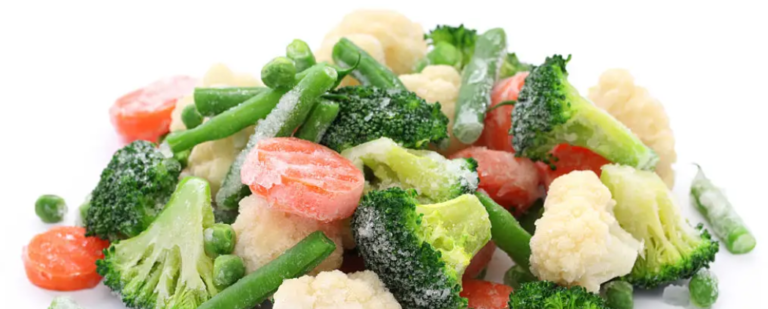We’ve all been there – staring at the wilted spinach in the fridge, feeling guilty about the broccoli we forgot to use. Enter frozen vegetables: the unsung heroes of a healthy diet. But are they really as good as fresh? Spoiler alert: sometimes, they’re even better! Let’s dive into why frozen veggies deserve a prime spot in your freezer and on your plate.
The Frozen Truth
Contrary to popular belief, frozen vegetables are often just as nutritious as their fresh counterparts. In fact, they might even have an edge. Here’s why:
1. Nutrient Lock-In
Picture this: a farm-fresh pea, picked at the peak of ripeness. Now, imagine that pea flash-frozen within hours of harvest. That’s exactly what happens with most frozen vegetables. This rapid freezing process locks in nutrients, preserving them better than the “fresh” vegetables that may have spent days traveling to your local store (1).
2. Convenience Meets Health
Let’s face it – life gets busy. Having a bag of frozen veggies ready to go can be the difference between a healthy home-cooked meal and another takeout night. No washing, no chopping – just pure, ready-to-cook goodness.
3. Reduced Food Waste
How many times have you thrown out spoiled produce? Frozen vegetables help reduce food waste, as you can use just what you need and keep the rest for later. It’s a win for your wallet and the environment!
The Science Behind the Ice
Research backs up the benefits of frozen veggies. A study published in the Journal of Food Composition and Analysis found that the vitamin content of frozen fruits and vegetables was comparable to, and in some cases higher than, their fresh counterparts (2).
Another study in the Journal of Agricultural and Food Chemistry showed that some frozen vegetables, like green beans and spinach, retained more vitamin C than fresh vegetables stored in the refrigerator for several days (3).
Recent Research Confirms Frozen Benefits
The advantages of frozen vegetables continue to be supported by new research. A 2022 review published in the journal Foods confirmed that freezing is highly effective at preserving nutrients in fruits and vegetables, often outperforming fresh produce stored for several days (4). Another study from 2021 highlighted how modern freezing technologies have further improved the nutritional quality and safety of frozen foods (5).
Interestingly, the impact of frozen vegetables extends beyond individual health. A 2020 study on gastronomic cultures noted how the availability of frozen produce has influenced culinary practices worldwide, allowing for greater dietary diversity and nutritional intake in various communities (6).
When Fresh Wins (And When It Doesn’t)
Of course, there’s nothing quite like a crisp salad or a juicy tomato fresh from the garden. Fresh vegetables are fantastic when they’re truly fresh – like from your backyard or a local farmer’s market. But for out-of-season produce or when you’re short on time, frozen veggies can be a smart choice.
Tips for Maximizing Frozen Veggie Goodness
1. Look for plain, unseasoned varieties to control sodium intake.
2. Avoid overcooking – a quick steam or stir-fry is often all you need.
3. Mix it up! Combine different frozen veggies for a colorful, nutrient-packed meal.
A Frozen Success Story
Meet Sarah, a busy mom who struggled to get her kids to eat vegetables. She started sneaking frozen spinach into smoothies and adding frozen mixed veggies to pasta sauces. The result? Her kids now eat more vegetables than ever, and she’s saved time and money on her grocery bills.
The Bottom Line
While fresh vegetables certainly have their place, don’t overlook the frozen aisle. These icy gems offer convenience, reduce food waste, and pack a nutritional punch that often rivals their fresh counterparts. So next time you’re grocery shopping, give those frozen peas a chance – your body (and your busy schedule) will thank you!
Remember, the best vegetables are the ones you actually eat. Whether fresh or frozen, the key is to make them a regular part of your diet. So go ahead, embrace the freeze!
Sources:
1. Bouzari, A., Holstege, D., & Barrett, D. M. (2015). Journal of Agricultural and Food Chemistry, 63(3), 957-962.
2. Li, L., Pegg, R. B., Eitenmiller, R. R., Chun, J. Y., & Kerrihard, A. L. (2017). Journal of Food Composition and Analysis, 59, 8-17.
3. Rickman, J. C., Barrett, D. M., & Bruhn, C. M. (2007). Journal of the Science of Food and Agriculture, 87(6), 930-944.
4. Neri, D., Tsang, C., & Smail, L. (2022). Foods, 11(19), 3007. https://doi.org/10.3390/foods11193007
5. Mishra, S., & Kulshrestha, K. (2021). In Food Quality and Shelf Life (pp. 171-192). Academic Press.
6. Oktay, S., & Sadıkoğlu, S. (2020). Journal of Ethnic Foods, 7(1), 1-11. https://doi.org/10.1186/s42779-020-00069-x
